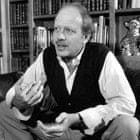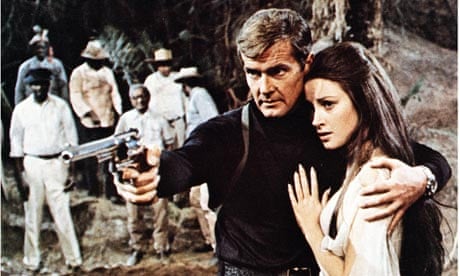For most film buffs, the name Mankiewicz immediately recalls Joseph L, the director and screenwriter of All About Eve (1950). For others, it evokes that of his older brother, Herman J, most celebrated as the writer of the screenplay of Citizen Kane. However, Joseph L's son, Tom Mankiewicz, who has died of cancer aged 68, is cherished by James Bond fans as the screenwriter of Diamonds Are Forever (1971), Live and Let Die (1973) and The Man With the Golden Gun (1974), as well as having worked on rewrites of The Spy Who Loved Me (1977) and Moonraker (1979).

At the beginning of his career, Mankiewicz admitted that he probably got work because of his father. "You suddenly started to realise that people were asking you because it was you," he explained. Unlike his father's best films – literate, dialogue-based vehicles – when a director called "action" on a Tom Mankiewicz-scripted movie, he really meant it.
He was born in Los Angeles, where his father was an MGM producer before becoming the Oscar-winning director of Letter to Three Wives (1949) and All About Eve. (His mother, the Austrian-born actor Rose Stradner, killed herself when Tom was 16.) It seemed natural that the boy should follow the family tradition, so he majored in drama at Yale University. Before graduation, aged 18, he worked as production assistant on The Comancheros (1961), a western starring John Wayne. In 1964 he was credited as production associate on The Best Man, Gore Vidal's sharp look at morality in politics.
His first screen credit as a writer was on The Sweet Ride (1968), a pseudo-philosophical movie about three beach bums. It was not a success, nor was the Broadway musical Georgy (1970), for which Mankiewicz's book was based on the 1966 British film Georgy Girl. Nevertheless, the producers Albert R Broccoli and Harry Saltzman hired him for two weeks to doctor the Richard Maibaum script of Diamonds Are Forever. He stayed for six months, receiving a co-screenplay credit.
Differing greatly from the Ian Fleming book of the same name, the script had 007 (Sean Connery) bounding from London to Amsterdam, LA to Las Vegas, on the trail of a huge diamond-smuggling operation, behind which lurks his arch-enemy, Blofeld (not in the novel). Bond has a good fight in an elevator, is pestered by two vicious gay men, and attracted by two beauties named Tiffany Case and Plenty O'Toole.
Connery, who had been enticed back to the role after four years away by a $1m fee, plus a weekly salary of $10,000, had not altered his droll style and sexual allure, although there was some change in his girth. When Roger Moore followed him in the part, Mankiewicz was entrusted to write the screenplay for Moore's first 007, Live and Let Die.
The film, which did well at the box office, proved that Connery was not irreplaceable as Bond. While Mankiewicz stuck to the winning formula – the film had spectacular set pieces, particularly an incredible speedboat chase through the Louisiana bayous – it leaned rather more on the humorous side, honed to Moore's more lightweight personality.
According to Mankiewicz, "the difference between Sean and Roger was that Sean looked dangerous. Sean could sit at a table with a girl at a nightclub and either lean across and kiss her or stick a knife in her under the table and then say, 'Excuse me waiter, I have nothing to cut my meat with.' Whereas Roger could kiss the girl, if he stuck a knife in her it would look nasty because Roger looks like a nice guy."
Although The Man With the Golden Gun, which Mankiewicz and Maibaum adapted from Fleming's last novel, had the usual stunts, exotic locales, a master criminal and sexy women popping up from time to time, it sometimes verged on self-parody. In fact, there is a tongue-in-cheek seam running through most of Mankiewicz's work.
In 1976 three films with Mankiewicz as writer were released: Mother, Jugs & Speed, starring Bill Cosby as a stoned ambulance driver; The Cassandra Crossing, a disaster movie with an all-star cast; and The Eagle Has Landed (based on the Jack Higgins novel), an entertaining but far-fetched thriller with Michael Caine as a German colonel infiltrating an English village in 1943 with the aim of kidnapping Winston Churchill.
In 1977 the director Richard Donner recruited Mankiewicz to work on the script of Superman, for which he received the credit of creative consultant, a fancy name for script doctor. He got the same credit for Superman II (1980), directed by Richard Lester, who added rather too much camp humour to footage that Donner had shot. Mankiewicz claimed to have written most of both pictures. He later helped Donner reconstruct Superman II, restoring all of the original footage that had been altered by the producers.
In between fixing other people's films, he co-wrote the screenplay for Donner's Ladyhawke (1985), a handsome-looking medieval fable of cursed lovers turning into animals. After directing 13 episodes of the TV adventure series Hart to Hart (1979-82), starring Robert Wagner and Stefanie Powers, he directed two movies, Dragnet (1987) and Delirious (1991) – the former being a mildly amusing spoof of Jack Webb's 50s TV series; the latter about a writer (John Candy) trapped in his own soap opera.
Mankiewicz is survived by his brother, Christopher, a producer and actor, and his sister, Alexandra.
